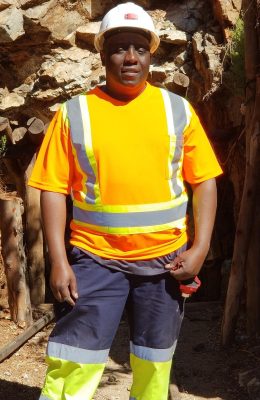The high cost of predatory pricing in Zim chrome mining

PASSERS-BY along the Gweru-Zvishavane Highway cannot help but shake their heads in dejection as they watch the once picturesque landscape slowly turning into unsightly craters and gullies — the work of small-scale miners scooping out tonnes of soil chasing fortunes hidden underneath the earth’s belly.
When NewsDay Weekender visited Shurugwi last week, scores of people could be seen loading soil and making off with trucks carrying heaped sedentary rocks from makeshift mines dotted around the area.
While locals are concerned as they helplessly watch their environs turned into wasteland, the activities are a boon to those in the thick of things, especially Chinese miners.
Tafara Nelson (38) says while chrome mining has been his only source of livelihood for the past decade, it is not rewarding.
“Since we don’t own mining equipment, we depend on Chinese contractors. After providing us with equipment, we are required to sell our produce to them,” he says.
Nelson, who is contracted by Chinese miner Jinan, says the language barrier also makes it difficult for them to negotiate fair payment terms.
“The result is that we get unfavourable conditions,” he adds.
Another small-scale miner, Martin Chitohwa, contracted by Zimasco, says as long as the status quo remains, locals will toil for nothing.
“Contract miners only get the final product price when graded and weighed at their Kwekwe plant. Who will ever know if the grading and weighing was done fairly?” Chitohwa asks rhetorically.
“They usually come to collect ore at night. In the morning, we are told, for example, that your chrome ore was 22 tonnes. Of that, 15 tonnes were lumpy and seven tonnes were fines and the grade was 42%, so we are paying you for the 15 tonnes at agreed price which is usually low.
“They penalise you on the fines. However, some smelters take both fines and hardy lumpy ores and price is indifferent as long as your fines are free from rubble.”
He says predatory pricing pushes local miners out of business.
Chinese company Sinosteel Corporation is the biggest shareholder in Zimasco, one of the country’s largest chrome-mining companies.
A Jinan official, Zhou Zhengliang, says while he does not deny that there are some bad apples in the chrome value chain, their operations are above board.
Zimasco chief executive John Musekiwa had not responded to questions sent to him by the time of going to print.
However, Confederation of Chrome Miners Association president Isaac Muguti Chivendera says smelters have exploited small-scale miners for too long.
“Small-scale miners are walking home empty-handed after delivering their product to private smelters, especially the Chinese,” he says.
“Buyers come to our claims and promise good prices, for example US$55 per tonne, carry the product to their smelting plants, then when you get there, they factor in transport costs and fines like breakages, then end up taking ore for a song. It then becomes difficult to continue mining because we pay as much as US$20 per tonne for labour.”
Former Zimbabwe Mining Federation vice-president (chrome and base metals) Simon Sigauke says this is a worrisome development as Zimbabwe is losing out to unscrupulous buyers.
“Chinese miners hire out machinery to small-scale miners at exorbitant rates and recover their money upon buying their proceeds. Our all-weather friends are making a killing from equipment that they would have imported duty-free,” he says.
“To make matter worse, most Chinese companies don’t issue out invoices as proof of payment. One wonders how these miners account for their tax obligations. Apple Bridge needs resuscitation urgently.”
Apple Bridge was a State entity, which bought chrome from small-scale miners after they complained that were being fleeced by private smelters buying the mineral below the market price. However, it is facing viability challenges.
“There is great need for government to resuscitate Apple Bridge for viable price monitoring and protection of local miners from being exploited by unscrupulous merchants,” Sigauke adds.
However, analysts say predatory pricing in one of Zimbabwe’s main exports will have negative after-effects on the socio-economic well-being of the country.
“Illicit financial flows (IFFs) occasioned by underhand dealings in the mining sector have deleterious effects on both the economy and society putting into perspective that minerals are Zimbabwe’s cash cow,” says University of Zimbabwe lecturer on natural resources governance, Babra Maiwasha.
“It is pertinent to note that the achievement of the US$12 billion mining sector and the broader Vision 2030 rests on the mining sector to boost domestic revenue. This precipitates the need for effective reforms and safeguards to foster transparency and accountability in the mining sector,” she adds.
“While these IFFs are difficult to quantify, they have a negative effect on the socio-economic status of the country in that funds that could have been used to develop these areas are instead illegally taken to tax havens through myriad of tax evasion tactics,” Centre for Natural Resource Governance director Farai Maguwu says.
The mid-term monetary review presented by Finance minister Mthuli Ncube last month was gloomy, revealing that chrome output for 2020, at 1 272 million tonnes, remained below the annual target of 1 800 million tonnes and was 18% less than the 2019 output of 1 550 million tonnes.
Basing on potential that lies in the sector, the government in 2019 launched an ambitious US$12 billion mining sector economy by 2023, a 312% increase from the current US$2,91 billion.


